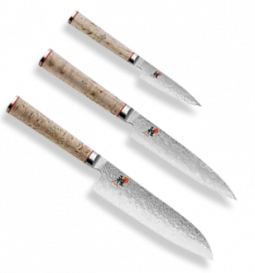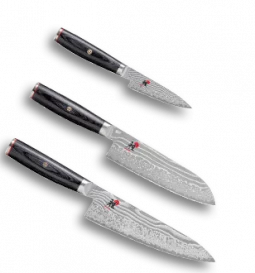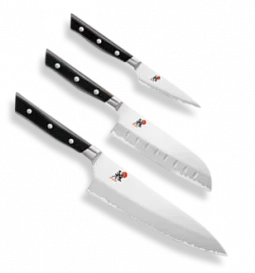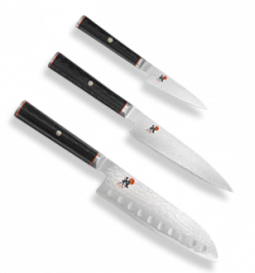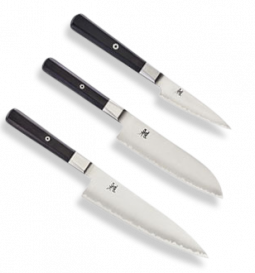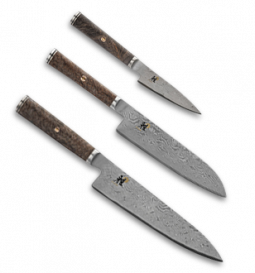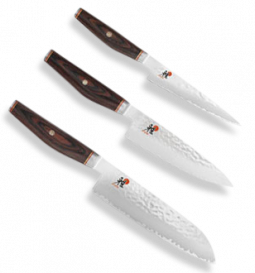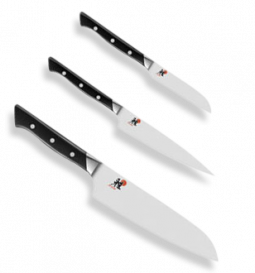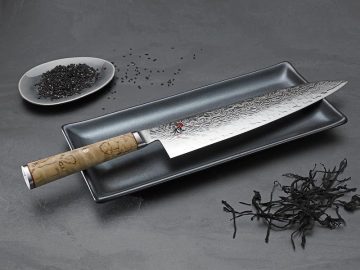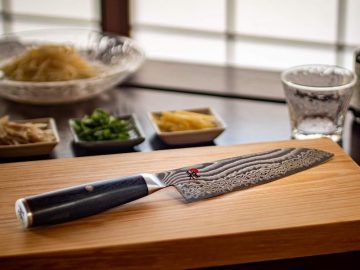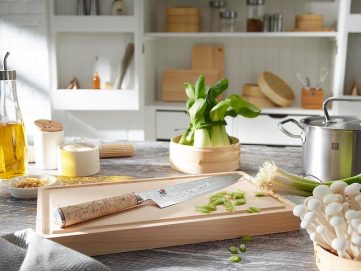Miyabi Knives
Japanese knives by miyabi meets the exacting requirements of exceptional sharpness, stability and cutting edge retention.

Gordon Ramsay
British celebrity chef and restaurateur
What are Miyabi Knives?
Miyabi knives are high-quality Japanese knives that are known for their sharpness, durability, and beauty. They are made using traditional Japanese techniques and are designed to be used for a variety of cutting tasks.
They are made using traditional Japanese techniques and are designed to be used for a variety of cutting tasks.
Miyabi Knives Series
Miyabi offers a wide range of knife series, each with its unique design, materials, and purpose. Whether you're a professional chef or a home cook, there's a Miyabi knife series that will suit your needs and preferences. From the classic and elegant Kaizen series to the innovative and modern Black series, Miyabi knives are known for their exceptional quality and craftsmanship.
Featured Products
Deal of the Day!
On the eve of the holidays, meet discounts for all Miyabi knives series.
70%
Pick up your knife today!
Types of Miyabi Knives
Gyutoh
A versatile chef's knife for general cutting tasks. It has a curved blade suitable for rocking cuts and slicing. The gyutoh typically ranges from 8 to 10 inches in length, making it adaptable for various ingredients. Its pointed tip allows for precision work, while the wide heel provides power for tougher cuts. This knife is essential for most kitchen tasks, from chopping vegetables to slicing meats.
Santoku
An all-purpose knife with a shorter, wider blade. Ideal for chopping, dicing, and mincing vegetables, meat, and fish. The name santoku means "three virtues," referring to its suitability for cutting meat, fish, and vegetables. Its flat edge and sheepsfoot blade tip make it excellent for push-cutting and create full contact with the cutting board. Santoku knives usually measure 5 to 7 inches in length.
Nakiri
A vegetable knife with a straight, rectangular blade. Perfect for precise, straight cuts and chopping vegetables efficiently. The nakiri's thin, double-beveled blade allows for clean cuts through vegetables without crushing them. Its straight edge makes it ideal for push-cutting and pull-cutting techniques. The squared-off tip is useful for scraping ingredients off the cutting board. Nakiri knives typically range from 5 to 7 inches in length.
Deba
A heavy-duty knife with a thick spine. Primarily used for breaking down whole fish and cutting through bones. The deba's robust construction allows it to handle tougher tasks without damaging the blade. Its single-bevel edge provides exceptional sharpness for filleting fish. While primarily designed for fish, it can also be used for poultry and other meats. Deba knives usually range from 6 to 8 inches in length.
Sujihiki
A long, narrow slicing knife. Designed for cutting thin slices of meat, fish, and other proteins with minimal drag. The sujihiki's length, typically 9 to 12 inches, allows for long, uninterrupted cuts. Its thin blade reduces friction, resulting in cleaner slices and less cellular damage to the food. This knife is particularly useful for carving roasts, slicing raw fish for sashimi, or portioning large cuts of meat.
Petty
A small utility knife for intricate work. Used for peeling, trimming, and detailed cutting of fruits and vegetables. The petty knife is essentially a smaller version of a chef's knife, usually measuring 3 to 5 inches in length. Its compact size makes it highly maneuverable for precise tasks like removing eyes from potatoes or deveining shrimp. It's also useful for cutting small fruits and herbs.
Yanagiba
A long, single-bevel slicer. Specialized for preparing sashimi and other raw fish dishes with clean, precise cuts. The yanagiba's length, typically 9 to 12 inches, allows for long, uninterrupted slices. Its single-bevel edge creates incredibly sharp cuts with minimal cellular damage, preserving the texture and flavor of delicate fish. The narrow blade reduces friction and prevents sticking. While primarily used for raw fish, it can also be employed for other delicate slicing tasks.
Miyabi Fillet Knife
A long, flexible blade designed for separating flesh from bones in fish and some meats. Typically 6 to 11 inches long, fillet knives have a narrow blade that can bend to follow the contours of fish bones, allowing for precise cuts and minimal waste. They're essential for preparing fish and can also be used for delicate butchering tasks on poultry and other meats.
Chef's Knife
Also known as a gyuto in Japanese cuisine, this is a versatile all-purpose knife. It usually has a blade length of 8 to 12 inches with a curved cutting edge. The chef's knife is designed for a variety of tasks including chopping, slicing, dicing, and mincing vegetables, fruits, and meats. Its broad blade can be used for crushing garlic or scooping up chopped ingredients.
Testimonials
I've been using Miyabi knives for several years now, and I can't imagine using anything else. The sharpness and precision of these knives are unparalleled, and they make cooking so much more enjoyable. I love how they feel in my hand and how easy they are to control. I highly recommend Miyabi knives to anyone who wants to take their cooking to the next level.

Jason Wong
journalist
I purchased the Miyabi Birchwood series chef's knife, and it's honestly the best knife I've ever owned. The blade is incredibly sharp and stays that way for a long time, even with frequent use. The handle is comfortable to grip, and the overall design is just stunning. It's definitely an investment, but it's worth every penny.

Jason Wong
CEO
I'm a professional chef, and I've been using Miyabi knives in my kitchen for years. They're simply the best knives out there. They're durable, reliable, and incredibly sharp. I've used them for everything from chopping vegetables to filleting fish, and they've never let me down. I recommend Miyabi knives to anyone who takes their cooking seriously.

Jason Wong
professional chef
FAQ
What is the difference between Miyabi knives and other Japanese knives?
Miyabi knives are a type of Japanese knife that are known for their exceptional sharpness and durability. One of the main differences between Miyabi knives and other Japanese knives is the manufacturing process. Miyabi knives are made using a unique process that involves ice-hardening the blade, which helps to increase its overall strength and resilience. Additionally, Miyabi knives are typically made using high-quality materials like VG-10 steel, which is known for its ability to hold a sharp edge for longer periods of time. Other Japanese knives may use different types of steel or manufacturing processes, which can affect their overall performance and durability. Ultimately, the choice between Miyabi knives and other Japanese knives will depend on your personal preferences and specific needs as a cook or chef.
How are Miyabi knives made?
Miyabi knives are made using a traditional Japanese knife-making technique called "Honbazuke". This process involves the use of a sharpening stone to sharpen and polish the blade to a precise angle of between 9.5 and 12 degrees on each side. The blade is then hardened using a process called "ice-hardening" or "Cryodur" which involves cooling the blade to -196 degrees Celsius in liquid nitrogen. This process enhances the blade's durability, strength, and corrosion resistance. Finally, the blade is polished and finished by skilled craftsmen who ensure that each knife is of the highest quality and meets Miyabi's strict standards.
What types of Miyabi knives are available?
Miyabi offers a variety of knives with different designs and purposes. Some of the types of Miyabi knives available are:
- Gyutoh - a general-purpose chef's knife
- Santoku - a Japanese-style chef's knife
- Petty - a small utility knife for peeling and slicing small fruits and vegetables
- Nakiri - a Japanese-style vegetable knife
- Sujihiki - a slicing knife for meats and fish
- Bread knife - a serrated knife for slicing bread
These are just a few examples of the types of Miyabi knives available. Each type may also have different subcategories with varying blade lengths and handle materials. It's important to choose a knife that suits your specific needs and preferences.
How do I care for my Miyabi knives to ensure they last a long time?
To ensure that your Miyabi knives last a long time, it is important to take good care of them. Here are some tips to help you care for your Miyabi knives:
- Hand wash your knives: Avoid putting your Miyabi knives in the dishwasher. Instead, hand wash them with warm soapy water and dry them immediately with a soft cloth.
- Use a honing rod: Regularly use a honing rod to maintain the sharpness of your Miyabi knives. A honing rod will help keep the blade aligned and will prevent dulling.
- Store your knives properly: Store your Miyabi knives in a knife block or on a magnetic strip. Avoid storing them in a drawer where they can get damaged or dull.
- Sharpen your knives: When your Miyabi knives become dull, sharpen them using a sharpening stone or have them professionally sharpened.
By following these tips, you can help ensure that your Miyabi knives last a long time and remain sharp and effective for all of your culinary needs.
Where are miyabi knives made
Miyabi knives are primarily made in Seki City, Japan. Here's some more detailed information:
- Location: Seki City is located in Gifu Prefecture, central Japan.
- Historical significance: Seki has been renowned for sword-making since the 13th century and is now famous for its high-quality kitchen knives.
- Manufacturing: The knives are produced at the Zwilling J.A. Henckels factory in Seki. Zwilling is a German company that owns the Miyabi brand.
- Craftsmanship: While using modern manufacturing techniques, Miyabi knives still incorporate traditional Japanese knife-making methods and aesthetics.
- Materials: Many of the steels used in Miyabi knives, such as VG10 and SG2, are produced in Japan.
- Brand origin: Although Miyabi is owned by a German company, the brand was created to showcase Japanese craftsmanship and knife-making traditions.
The combination of traditional Japanese craftsmanship with German engineering and quality control has made Miyabi a respected name in the culinary knife industry.
Contact Us
Zwilling Miyabi Knives
Phone: 646-466-2555
Email: hello@miyabiknives.com
Hours: MON - FRI: 9AM-5PM (EST)
